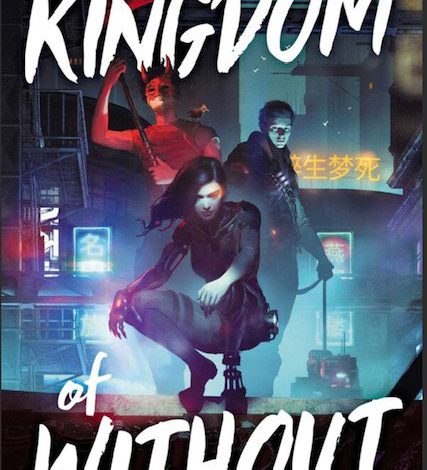In Kingdom of Without, Andrea Tang pens a story about socioeconomic class differences and the challenges that those in the lower classes face just to survive. To tell her story, Tang creates an allegory that bumps up against truth and gives the reader ample food for thought.
Set in Beijing, nearly 150 years since General Yuan Shikai successfully declared himself the Emperor of China in 1915, the story opens in the Sixth Ring, where a seventeen-year-old street urchin is getting new prosthetics from Ge Rong. An art and engineering savant who is talented not only with biohacks, Ge Rong engineers tools and techniques for a variety of purposes—whether for a retired cat burglar like his current client, Zhong Ning’er, or a group of insurgents hoping to breach security to break a political legend out of a secret laboratory prison owned by the Lilium Corporation.
The biggest pharmaceutical company in the kingdom, Lilium, manufactures a drug that most of the people in the country are addicted to. Called Complacency, it is an oxyveris that enhances physical abilities. Both literally and figuratively, the drug costs an arm and a leg; therefore, many people require the services of Ge Rong and those with his talent and aptitude. Originally, Ning’er’s father sold his daughter’s limbs to feed his own drug habit. Since then, Ning’er has had to sell her prosthetics on multiple occasions to pay her rent or to put food on her table.
Using schemes akin to blackmail, Lilium also has the Beiyang clique—their army, their cyborgs, and the Brocade Guard—in their corner, passing policies that allow them to manufacture illegal substances and buying favors in return for protection.
The people fight this corruption as best they can, and a rebel group that backs the Red Yaksha has decided to hire a thief for their next mission. Dedicated to his convictions that the world can be a less corrupt place, the Red Yaksha is an enemy of the imperial court and the bane of the gendarme. He is also “the most beloved hero of the Lower Rings: the anonymous savior who lurked, shadow-like, beneath the cover of night to steal from the Upper Rings and feed the poor” (7).
When Ning’er learns that Cheng Yun, the Young Marshal, is working at cross purposes as the Red Yaksha, hope awakens in her, and she decides to come out of retirement to steal He Bailing, also known as the Lark. He Bailing was born to poverty and seemingly destined to die in it until she started using her heaven-given talents: beauty, a hard-muscled charm, a charismatic voice, and a self-taught knowledge of political science and history to give the people something to hope for. She became the face behind a rebellion to overthrow those in power, until she disappeared after a rally and was believed killed.
To perform this human heist, Ning’er joins a demolitionist, a hacker, and a medic. These are the circumstances around which Tang weaves her story. Along for the ride with Ning’er, whose stealing gives her a feeling of power and control over her life, the reader learns a variety of important lessons. For example, people are not the sum of the worst things they have ever done. We all do bad things for the sake of survival, but we all have threads of decency and goodness. Furthermore, we realize that hope can be cruel and that breath sustains us when nothing else does.
Tang’s text is both fast-paced and action-packed. Her novel contains surprises and plot twists that keep the reader intrigued, while hinting—like a good satire does—at difficult truths and drawing parallels to flaws in contemporary society.
- Posted by Donna

